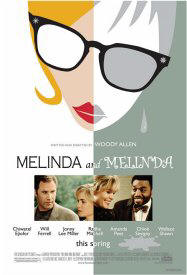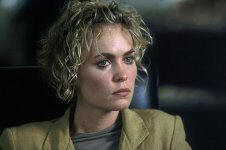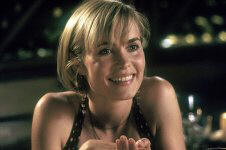Melinda And Melinda
Reviewed By Rich Drees
 Growing up in the 1970s, one of my favorite comic books was a series
called What If--?. Each issue, the writers and artists would
take a well known superhero tale, say the origin of Spider-Man,
change one basic plot element and then explore the story that
spiraled out of the alteration. Besides supplying an afternoon’s
worth of four-color pulp entertainment, the series was a fine
example on how a fictional character could be explored through
different story structures. In Melinda And Melinda,
writer/director Woody Allen takes a similar approach to character
study, taking a character and basic premise and then filtering them
through two different story telling modes.
Growing up in the 1970s, one of my favorite comic books was a series
called What If--?. Each issue, the writers and artists would
take a well known superhero tale, say the origin of Spider-Man,
change one basic plot element and then explore the story that
spiraled out of the alteration. Besides supplying an afternoon’s
worth of four-color pulp entertainment, the series was a fine
example on how a fictional character could be explored through
different story structures. In Melinda And Melinda,
writer/director Woody Allen takes a similar approach to character
study, taking a character and basic premise and then filtering them
through two different story telling modes.
In a Manhattan eatery, a group of
friends have just finished hearing the story of Melinda, a troubled
woman who interrupts a dinner party. Two writers in the group, Sy
(Wallace Shawn) and Max (Larry Pine) argue over whether the story of
Melinda would make a better tragic or comic tale. In one tale,
Melinda (Radha Mitchell) crashes a dinner party being thrown by two
former college friends. She’s a chain-smoking, hard-drinking,
emotionally drained woman trying to put her past behind her. This
Melinda is not too different from the emotionally fragile Melinda,
neighbor to Hobie (Will Farrell) and Susan (Amanda Peet), whose
dinner party is disturbed by Melinda’s abrupt arrival and
announcement that she has taken an overdose of sleeping pills. Soon,
each Melinda has entwined herself into the other characters’ lives
with both differing and similar results.
While it’s no surprise which set of characters will get their happy endings and which will not, the pleasure her is the journey, not the destination. The narrative conceit of two separate stories about the same character is a clever one and Allen works it well. Although the stories end in two different places, echoes of each can be found in the other. A line of dialogue spoken in one story will return in the other with a vastly different meaning. The same location will be visited for different reasons while similar conversations are held in different, yet parallel locales.
Mitchell is an incredible revelation in her dual role, with her embodiment of the tragic and comic Melindas differentiated by more than just hairstyle or wardrobe. The comic Melinda has a radiance about her that remains undimmed by the circumstances of her life. The tragic Melinda has been beaten down life and it shows. Her face is gaunt and the lines around her eyes are pronounced, making her look much older than her two friends. The rest of the cast also contributes sterling work. Will Farrell, as a married man who falls for Melinda in the comic storyline, tones down his own comic persona, adapting his performance to Allen’s material.
 Allen’s last few films have been scattershot affairs. While some
elements worked, the films themselves never coalesce into cohesive
wholes. It’s ironic then that Melinda And Melinda, with its
dual disparate takes on the same character, is his best work since
1997’s Deconstructing Harry. Allen’s dialogue, with lines
like “Of course we communicate, now can we stop talking crackles
with a verve not hear in this?” crackles with a verve not heard in
his films in a long time. There are a few minor problems to be had
with the film. The opening scene, wherein the two writers argue over
whether life is ultimately tragic or comic, feels a bit artificial
with the writers sounding like two undergrad film students with
theoretical axes to grind. Also, with each storyline receiving only
half of the film’s screen time, some characters are presented in
broad strokes only, though this is to be expected.
Allen’s last few films have been scattershot affairs. While some
elements worked, the films themselves never coalesce into cohesive
wholes. It’s ironic then that Melinda And Melinda, with its
dual disparate takes on the same character, is his best work since
1997’s Deconstructing Harry. Allen’s dialogue, with lines
like “Of course we communicate, now can we stop talking crackles
with a verve not hear in this?” crackles with a verve not heard in
his films in a long time. There are a few minor problems to be had
with the film. The opening scene, wherein the two writers argue over
whether life is ultimately tragic or comic, feels a bit artificial
with the writers sounding like two undergrad film students with
theoretical axes to grind. Also, with each storyline receiving only
half of the film’s screen time, some characters are presented in
broad strokes only, though this is to be expected.
Quibbles aside, this is a delightful return to form for Allen and hopefully an indicator of things to come from the director.